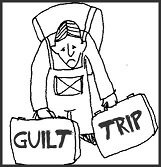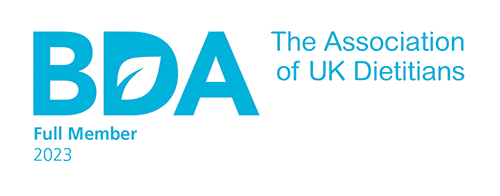Guilt trip
With Easter around the corner, and chocolate flying off the shelves, how many of you are packing your bags for your next guilt trip?
Picture the scene: 1 cake, 2 people.
Person 1 sees cake. Considers if they want some. Eats cake. The end.
Person 2 sees calories, fat, temptation, a test, a challenge, a risk. They feel in dangerous territory but they eat some cake. They’re not paying attention to whether the cake is delicious or not because the main thought in their head is:
I SHOULDN’T BE EATING THIS
But they have started now so they may as well carry on. They decide they will not eat cake again for a long time so it’s OK if they overeat it now. They can diet harder tomorrow.
So they continue to eat, still not really paying attention to the cake enjoyment because the niggling thought of doing something ‘bad’ lingers, and this grows into:
GUILT
The damage is done now, they have lost the battle with the cake, and surrender to eating it with abandon.
If only that was the end of the story. Feeling guilty about their actions (eating cake) is bad enough. But then this happens:
SHAME
They feel bad about themselves and decide they must be greedy, weak, lacking in willpower, a failure….and the scene is set for unhelpful eating for the rest of the day, maybe even the rest of the week or longer.
Brought down by a piece of cake
How can the same situation result in such a different outcome?
A study published in the journal Appetite in 2013 took a stereotypical ‘forbidden’ food item (chocolate cake) and compared ‘guilt’ eaters with ‘celebration’ eaters.
Those who attached guilt to eating had:
- lower levels of perceived food control, and
- were less successful at losing weight
than those who associated the food with celebration.
It all boils down to your ‘relationship’ with food, how you view food, and how you make decisions about what to eat and when to stop eating.
These are all changeable / modifiable factors, and working to improve how you feel about, and manage, food will have a major impact on how you feel about your food choices, which will go on to affect how much of it you eat.
The irony…
Many people can suffer from food guilt for many different reasons, but chronic dieters appear to be particularly susceptible because dieting mentalities are one reason for experiencing food guilt.
The point of dieting is to lose weight, but if people who diet suffer from food guilt, this can make keeping weight off very difficult.
If you feel guilty while eating, this is a warning signal, your head sending you a mental distress call, alerting you to a problem that needs to be fixed. Something has broken down in terms of your relationship with that food, a problem with how you view that food.
Add to that the fact that feeling this way often leads to ongoing eating and it becomes crystal clear that food guilt is a useless, pointless and destructive emotion.
What this DOESN’T mean
So what we eat and how much we eat is irrelevant as long as we don’t feel guilty about it? NO, NO and NO. You can’t eat your body weight in chocolate as long as you do it in the name of celebration. If only it was that simple.
Saying ‘Don’t feel guilty’ is not enough.
Food guilt is not healthy but telling yourself “I’m going to eat this and not feel guilty” is likely to be as effective as telling a baby to stop crying.
Thoughts, feelings and emotions cannot be switched on and off. Some are warning signs – food guilt is one of these. You need to take food guilt back to its roots, find its source, question the accuracy of your view, and see the problem for what it is – the problem is NOT food, the problem is NOT you, the problem is whatever has distorted your view of food.
How can I fight food guilt?
Since guilt stems from doing something you think you shouldn’t have done, eating without guilt requires you to:
- Question where that thought came from
- Stop making food decisions based on what you think you should eat, and start thinking more about what you actually feel like and want. Reclaim your right to make your own decisions about food.
- Stop labelling food as ‘good’ or ‘bad’
- Abandon hard and fast food rules, and replace with boundaries (for example, move away from “I’m on a diet so I’m not allowed cake” or “I’m not on a diet so I can eat as much cake as I can”, and move towards “I will eat some cake if I decide I want some, and I will only continue to eat it if it is delicious and stop when I am satisfied” – yes, you can learn how to do this!)
- Use more helpful cues to guide your eating – hunger, fullness, food pleasure and satisfaction are the major players here.
Celebrate
If you have a history of food guilt it’s not going to just disappear. But you can get help to understand and manage it, and in time learn how to celebrate food.
There’s only one reason to eat chocolate – pure food pleasure. If you’re eating with guilt, you’re missing:
- the pleasure, and,
- the opportunity to make your own decision about when to stop
Appropriate enjoyment of any food should never be followed by inappropriate overeating as a punishment for enjoying it. Food guilt is a weapon that has no place at the table.





